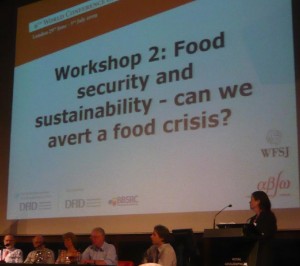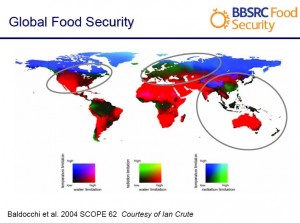Peter Griffin in London – A day ahead of the opening of the World Conference of Science Journalists in a sweltering London, it is sessions on climate change that are attracting the majority of journalists gathered for a series of pre-conference workshops at the Royal Geographical Society.
 But across the corridor a fascinating series of presentations from food security experts outline what is a much more immediate and tangible threat, and one for which climate change is a major contributing factor. The pressure of escalating population numbers is set to take a major toll on the planet’s ability to sustain life. Most grow indicators suggest the world population will exceed 9 billion people in 2050. Currently the world population is growing at a rate of 1.5 million people per week.
But across the corridor a fascinating series of presentations from food security experts outline what is a much more immediate and tangible threat, and one for which climate change is a major contributing factor. The pressure of escalating population numbers is set to take a major toll on the planet’s ability to sustain life. Most grow indicators suggest the world population will exceed 9 billion people in 2050. Currently the world population is growing at a rate of 1.5 million people per week.
For the first time in human history more people now live in urban rather than rural areas. As people obtain higher paying jobs their diet is changing, with surging demand for beef and dairy products. The need for increased food production to feed the growing population is also putting stress on energy resources – fossil fuel powers the food supply chain. Almost 70 per cent of the world’s fresh water usage goes towards irrigation used in agriculture and global demand for water for agricultural purposes is expected to increase by 30 per cent by 2030. This despite the fact that water is predicted to become more scarce than ever before.
Last year produced a fleeting glimpse of the future when spiking prices for staple foods led to riots in Mexico and Indonesia.
A concoction of factors – population growth, scarce energy and water resources and demands of a growing middle class in the developing world has set the scene for what Britain’s chief science advisor John Beddington has labeled a “perfect storm”.
“We head into a perfect storm in 2030, because all of these things are operating on the same time frame,” he told the Guardian in March.
“If we don’t address this, we can expect major destabilisation, an increase in rioting and potentially significant problems with international migration, as people move out to avoid food and water shortages,” he added.
Professor Douglas Kell, chief executive of the Biological and Biotechnology Research Council, painted the future in terms just as stark.
“We need to double food yield per hectare by 2050. The challenge is to do it with no more land less chemicals, less water and in a way that reduces greenhouse gases,” he told WCSJ attendees.
Standing in the way of those goals are some formidable barriers. Chief among them is that relentless population growth and the demand on food resources that comes with greater wealth. Climate change, which could dry up key strategic water sources, such as the crucial Himalayan glaciers, threatens food production across the world and developing nations will be hardest hit. Fuel and fertiliser will cost more and biofuel production will put further pressure on crop yields for food.
The only way to combat the looming problem of food security, says Professor Kell and others addressing the WCSJ this week, is to come up with scientific solutions to improve agricultural productivity, increase the yield per hectare for staple crops such as wheat and cut down on the waste in the agricultural sector. Currently, up to 40 per cent of post-harvest crop output is wasted due to deterioration in storage and transport. In the Western world in particular, a vaste amount of food simply goes uneaten and is thrown away.
John Barrett, the deputy head of the UK’s Department for International Development (DFID) said the agricultural sector would need “huge innovation” to overcome the huge pressure on the world’s food resources.
“We are facing a world in which the environment producing this food is becoming distressed and degraded,” he said.
“We have to admit we’ve collectively dropped the ball on tackling agriculture and hunger.”
Barrett urges an emphasis on agricultural R&D. The UK, via DFID, has doubled funding in this area, annoucing last year a 455 million pound aid package to address “rising global food prices”.
Listen to this podcast of Professor Douglas Kell’s presentation to the WCSJ workshop on food security.
[audio:https://www.sciencemediacentre.co.nz/wp-content/upload/2009/06/douglas-kell.mp3]John Barrett on the food miles debate and food security
[audio:https://www.sciencemediacentre.co.nz/wp-content/upload/2009/06/food-miles-question.mp3]